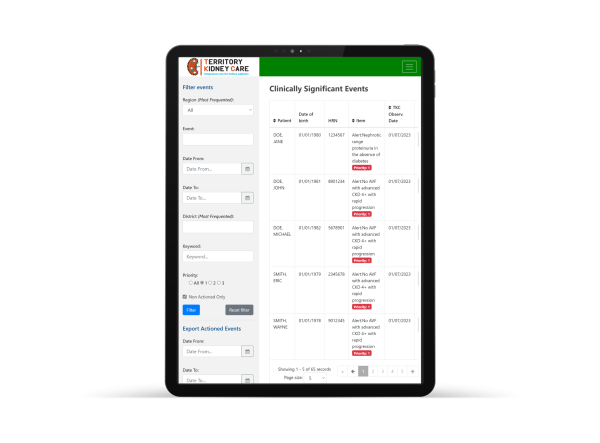
Background
The NT has the highest rates of kidney disease in Australia, and the demand for renal replacement therapy continues to exceed projections much earlier than anticipated. Remote areas of the NT mostly populated by indigenous groups are especially affected by chronic kidney disease. The situation in these areas is made more difficult by transient populations, high attrition rates amongst health staff, and difficulties in communication between health services. The economic and social cost of chronic kidney disease is enormous. Earlier intervention and active management slows progression of the disease and reduces the demand for expensive and oversubscribed renal replacement therapy services such as haemodialysis.

The Project
A key component of the Territory Kidney Care project was to develop an information system that facilitates better care of people with, or at risk of, chronic kidney disease. This is achieved by:
aggregating clinical information such as: pathology results, prescribed medications, diagnoses, episodes of care -- from multiple isolated clinical systems to provide a complete picture through a “single pane of glass”
alerting clinicians to medical events that may otherwise have been missed, potentially allowing the earlier identification of chronic kidney disease and enabling earlier intervention
providing evidence-based care information to primary care providers through the application of guidelines-based rules that make use of the aggregated data
making the provision of care to patients more efficient through the presentation of data in a form most useful to clinicians and their patients.
These software features are intended to assist in meeting the primary Territory Kidney Care objectives of creating efficiencies in chronic kidney disease management, providing support to primary care, decreasing the rates of related unplanned hospital admissions, and addressing the ever-increasing demand for renal replacement therapies.
The Client
Territory Kidney Care is an initiative of the Menzies School of Health Research (“Menzies”). Menzies describes their vision as “finding enduring solutions to health problems that matter”.
Territory Kidney Care is made up of more than just an information system. However, the Territory Kidney Care system (“TKC”) is central to the incredible work of Menzies in finding enduring solutions to the tragedy of escalating rates of kidney disease.
Developing Territory Kidney Care
Radical Systems was engaged by Menzies to develop the Territory Kidney Care information system by working in close collaboration with their Wellbeing & Preventable Chronic Disease (WPCD) division.
Although it is commercially ideal to have detailed software requirements known at the commencement of a project, it is often an unrealistic expectation. Our approach was to accept the uncertainty that comes with such projects, and work closely with the client on building a prototype that could be progressively enhanced. This is challenging in the eHealth domain where change and innovation are often seen as the natural enemies of safety and stability.
The project was underpinned by a strong governance foundation which included stakeholders from across health services, governing bodies, private practice and the Northern Territory Government. Project responsibilities were clearly defined, with clinicians developing the rules by which the data is interpreted and provided to other clinicians. This enabled Radical Systems to maintain a focus on the technology solution.
Our approach was to develop TKC using open-source technologies, with Microsoft .NET providing the application development platform. Python was also used to develop a rules engine. While many vendors would advocate for the use of a lock-in platform, Radical Systems always chooses to develop products using the technology that is the best fit for the intended purpose. We believe our customers return to us because of the quality of the services we provide, and the products we deliver, not because we lock them into a proprietary platform that is difficult to exit. We also consider the availability and cost of skillsets required to maintain and enhance systems sustainably into the future.

Outcomes
The Territory Kidney Care system has been live for around five years and adoption has been excellent.
Most government primary health services and hospitals, and 11 out of the 13 largest Aboriginal community-controlled health services (ACCHOs) in the Northern Territory are providing relevant data to TKC. Individuals can opt out of inclusion through their participating health service.
The Clinically Significant Event module is demonstrably supporting early intervention by alerting renal clinicians to potentially otherwise unnoticed recent medical events. It has also been seen that many people identified by TKC as having late-stage chronic kidney disease do not have this diagnosis recorded in their primary electronic health record.
Primary health care clinicians have praised the patient synopsis report for providing a useful summary of longitudinal data, which would otherwise have to be manually gathered and pieced together from multiple sources. The synopsis presents data in a similar fashion to a discharge summary, but is typically much richer in valuable information. It requires no human intervention to produce, but can still be customised by clinicians prior to being delivered to a recipient (if applicable).
A planned formal evaluation will assess the impact of TKC including the costs and benefits of the system.
In any event, it is clear that from clinician feedback that it is changing the way they manage chronic kidney disease, and changing the lives of the people of the Northern Territory.